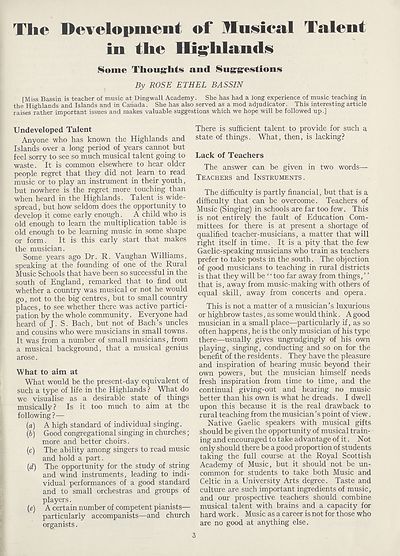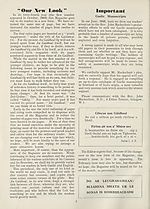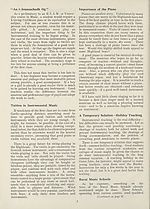An Comunn Gàidhealach Publications > Gaidheal > Volumes 44--45, January 1949--December 1950
(13) Page 3
Download files
Complete book:
Individual page:
Thumbnail gallery: Grid view | List view

Tlie Development of Musical Talent
in the Highland*
Nome Thought* and Nuggrestions
By ROSE ETHEL BAS SIN
[Miss Bassin is teacher of music at Dingwall Academy. She has had a long experience of music teaching in
the Highlands and Islands and in Canada. She has also served as a mod adjudicator. This interesting article
raises rather important issues and makes valuable suggestions which we hope will be followed up.]
Undeveloped Talent
Anyone who has known the Highlands and
Islands over a long period of years cannot but
feel sorry to see so much musical talent going to
waste. It is common elsewhere to hear older
people regret that they did not learn to read
music or to play an instrument in their youth,
but nowhere is the regret more touching than
when heard in the Highlands. Talent is wide¬
spread, but how seldom does the opportunity to
develop it come early enough. A child who is
old enough to learn the multiplication table is
old enough to be learning music in some shape
or form. It is this early start that makes
the musician.
Some years ago Dr. R. Vaughan Williams,
speaking at the founding of one of the Rural
Music Schools that have been so successful in the
south of England, remarked that to find out
whether a country was musical or not he would
go, not to the big centres, but to small country
places, to see whether there was active partici¬
pation by the whole community. Everyone had
heard of J. S. Bach, but not of Bach’s uncles
and cousins who were musicians in small towns.
It was from a number of small musicians, from
a musical background, that a musical genius
arose.
What to aim at
What would be the present-day equivalent of
such a type of life in the Highlands ? What do
we visualise as a desirable state of things
musically? Is it too much to aim at the
following? —
{a) A high standard of individual singing.
(6) Good congregational singing in churches;
more and better choirs.
(c) The ability among singers to read music
and hold a part.
{d) The opportunity for the study of string
and wind instruments, leading to indi¬
vidual performances of a good standard
and to small orchestras and groups of
players.
(e) A certain number of competent pianists—
particularly accompanists—and church
organists.
There is sufficient talent to provide for such a
state of things. What, then, is lacking?
Lack of Teachers
The answer can be given in two words—
Teachers and Instruments.
The difficulty is partly financial, but that is a
difficulty that can be overcome. Teachers of
Music (Singing) in schools are far too few. This
is not entirely the fault of Education Com¬
mittees for there is at present a shortage of
qualified teacher-musicians, a matter that will
right itself in time. It is a pity that the few
Gaelic-speaking musicians who train as teachers
prefer to take posts in the south. The objection
of good musicians to teaching in rural districts
is that they will be ‘ ‘ too far away from things, ’ ’
that is, away from music-making with others of
equal skill, away from concerts and opera.
This is not a matter of a musician’s luxurious
or highbrow tastes, as some would think. A good
musician in a small place—^particularly if, as so
often happens, he is the only musician of his type
there—^usually gives ungrudgingly of his own
playing, singing, conducting and so on for the
benefit of the residents. They have the pleasure
and inspiration of hearing music beyond their
own powers, but the musician himself needs
fresh inspiration from time to time, and the
continual giving-out and hearing no music
better than his own is what he dreads. I dwell
upon this because it is the real drawback to
rural teaching from the musician’s point of view.
Native Gaelic speakers with musical gifts
should be given the opportunity of musical train¬
ing and encouraged to take advantage of it. Not
only should there be a good proportion of students
taking the full course at the Royal Scottish
Academy of Music, but it should not be un¬
common for students to take both Music and
Celtic in a University Arts degree. Taste and
culture are such important ingredients of music,
and our prospective teachers should combine
musical talent with brains and a capacity for
hard work. Music as a career is not for those who
are no good at anything else.
in the Highland*
Nome Thought* and Nuggrestions
By ROSE ETHEL BAS SIN
[Miss Bassin is teacher of music at Dingwall Academy. She has had a long experience of music teaching in
the Highlands and Islands and in Canada. She has also served as a mod adjudicator. This interesting article
raises rather important issues and makes valuable suggestions which we hope will be followed up.]
Undeveloped Talent
Anyone who has known the Highlands and
Islands over a long period of years cannot but
feel sorry to see so much musical talent going to
waste. It is common elsewhere to hear older
people regret that they did not learn to read
music or to play an instrument in their youth,
but nowhere is the regret more touching than
when heard in the Highlands. Talent is wide¬
spread, but how seldom does the opportunity to
develop it come early enough. A child who is
old enough to learn the multiplication table is
old enough to be learning music in some shape
or form. It is this early start that makes
the musician.
Some years ago Dr. R. Vaughan Williams,
speaking at the founding of one of the Rural
Music Schools that have been so successful in the
south of England, remarked that to find out
whether a country was musical or not he would
go, not to the big centres, but to small country
places, to see whether there was active partici¬
pation by the whole community. Everyone had
heard of J. S. Bach, but not of Bach’s uncles
and cousins who were musicians in small towns.
It was from a number of small musicians, from
a musical background, that a musical genius
arose.
What to aim at
What would be the present-day equivalent of
such a type of life in the Highlands ? What do
we visualise as a desirable state of things
musically? Is it too much to aim at the
following? —
{a) A high standard of individual singing.
(6) Good congregational singing in churches;
more and better choirs.
(c) The ability among singers to read music
and hold a part.
{d) The opportunity for the study of string
and wind instruments, leading to indi¬
vidual performances of a good standard
and to small orchestras and groups of
players.
(e) A certain number of competent pianists—
particularly accompanists—and church
organists.
There is sufficient talent to provide for such a
state of things. What, then, is lacking?
Lack of Teachers
The answer can be given in two words—
Teachers and Instruments.
The difficulty is partly financial, but that is a
difficulty that can be overcome. Teachers of
Music (Singing) in schools are far too few. This
is not entirely the fault of Education Com¬
mittees for there is at present a shortage of
qualified teacher-musicians, a matter that will
right itself in time. It is a pity that the few
Gaelic-speaking musicians who train as teachers
prefer to take posts in the south. The objection
of good musicians to teaching in rural districts
is that they will be ‘ ‘ too far away from things, ’ ’
that is, away from music-making with others of
equal skill, away from concerts and opera.
This is not a matter of a musician’s luxurious
or highbrow tastes, as some would think. A good
musician in a small place—^particularly if, as so
often happens, he is the only musician of his type
there—^usually gives ungrudgingly of his own
playing, singing, conducting and so on for the
benefit of the residents. They have the pleasure
and inspiration of hearing music beyond their
own powers, but the musician himself needs
fresh inspiration from time to time, and the
continual giving-out and hearing no music
better than his own is what he dreads. I dwell
upon this because it is the real drawback to
rural teaching from the musician’s point of view.
Native Gaelic speakers with musical gifts
should be given the opportunity of musical train¬
ing and encouraged to take advantage of it. Not
only should there be a good proportion of students
taking the full course at the Royal Scottish
Academy of Music, but it should not be un¬
common for students to take both Music and
Celtic in a University Arts degree. Taste and
culture are such important ingredients of music,
and our prospective teachers should combine
musical talent with brains and a capacity for
hard work. Music as a career is not for those who
are no good at anything else.
Set display mode to:
![]() Universal Viewer |
Universal Viewer | ![]() Mirador |
Large image | Transcription
Mirador |
Large image | Transcription
| An Comunn Gàidhealach > An Comunn Gàidhealach Publications > Gaidheal > Volumes 44--45, January 1949--December 1950 > (13) Page 3 |
|---|
| Permanent URL | https://digital.nls.uk/127122192 |
|---|
| Description | This contains items published by An Comunn, which are not specifically Mòd-related. It includes journals, annual reports and corporate documents, policy statements, educational resources and published plays and literature. It is arranged alphabetically by title. |
|---|
| Description | A collection of over 400 items published by An Comunn Gàidhealach, the organisation which promotes Gaelic language and culture and organises the Royal National Mòd. Dating from 1891 up to the present day, the collection includes journals and newspapers, annual reports, educational materials, national Mòd programmes, published Mòd literature and music. |
|---|---|
| Additional NLS resources: |
|

